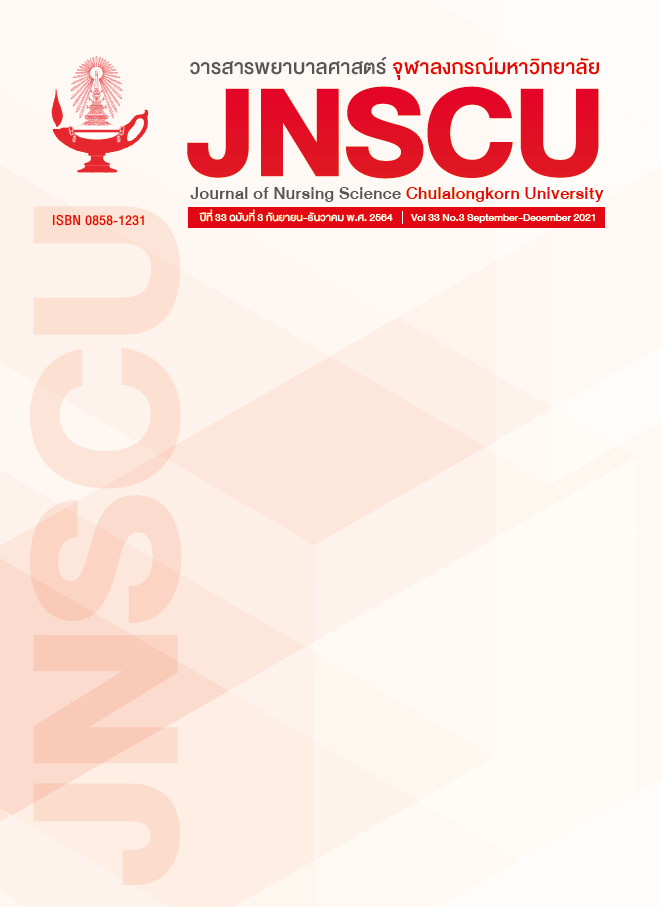บทบาทของพยาบาลในการส่งเสริมโภชนาการและพฤติกรรมการรับประทานอาหารสำหรับเด็กวัยก่อนเรียน
คำสำคัญ:
บทบาทพยาบาล, การส่งเสริมโภชนาการ, พฤติกรรมการรับประทานอาหาร, เด็กวัยก่อนเรียนบทคัดย่อ
บทความนี้มีวัตถุประสงค์เพื่อเสนอบทบาทของพยาบาลในการส่งเสริมโภชนาการและพฤติกรรมการรับประทานอาหารสำหรับเด็กวัยก่อนเรียน ภาวะโภชนาการในเด็กสามารถเป็นตัวชี้วัดถึงภาวะสุขภาพในภาพรวมและเป็นพื้นฐานที่สำคัญต่อการเจริญเติบโตด้านร่างกายและสติปัญญาของเด็ก หากเด็กไม่ได้รับการดูแลที่เหมาะสม และมีพฤติกรรมการรับประทานอาหารที่ไม่ดี ย่อมส่งผลต่อสุขภาพของเด็กได้ทั้งในปัจจุบันและอนาคตเมื่อเด็กโตขึ้น พยาบาลเด็กจึงมีบทบาทสำคัญในการให้คำแนะนำกับผู้ปกครอง รวมทั้งเป็นสื่อกลางในการให้ความรู้กับครูและพี่เลี้ยงเด็กในโรงเรียนหรือสถานรับเลี้ยงเด็กในการส่งเสริมโภชนาการและพฤติกรรมการรับประทานอาหารของเด็กให้เหมาะสม ซึ่งพยาบาลเด็กต้องมีความเข้าใจเบื้องต้นเกี่ยวกับพัฒนาการของเด็กวัยก่อนเรียนที่สอดคล้องกับการรับประทานอาหารของเด็ก ความต้องการสารอาหารของเด็ก ตลอดจนวิธีการดูแลจัดเตรียมอาหาร การส่งเสริมเด็กให้มีพฤติกรรมการรับประทานอาหารที่ดี และการจัดบรรยากาศที่น่ารื่นรมย์ในการรับประทานอาหาร ซึ่งเป็นการส่งเสริมพฤติกรรมการรับประทานอาหารที่เหมาะสมสำหรับเด็กวัยก่อนเรียน เพื่อให้เด็กวัยก่อนเรียนได้รับการดูแลที่เหมาะสม และมีสุขภาวะที่ดีต่อไป
เอกสารอ้างอิง
Ashcroft J, Semmler C, Carnell S, Van Jaarsveld
CHM, Wardle J. Continuity and stability
of eating behaviour traits in children.
European journal of clinical nutrition
; 62(8): 985-90.
Sakunwanwong T, Saengsawang P. Meal
consumption by parental care and
nutrition of school age at Ngao district,
Lampang Province. TUH Journal online
; 3(2): 29-38. (in Thai)
Belagavi D. Theories of growth and development
in pediatrics: A review. IP Journal
of Paediatrics and Nursing Science 2019;
(3): 63-6.
The Royal College of Pediatricians of Thailand
& Pediatric Society of Thailand. Guideline
of childcare and development for
parents: Preschool child aged 3-6 years
Bangkok: Pediatric Society of Thailand
[Internet]. 2017 [cited 2021 Jul 27].
Available from: http://www.thai
pediatrics.org/Media/media-2017
pdf.
Kyle T. Essentials of pediatric nursing.
Philadelphia: Wolters Kluwer Health/
Lippincott Williams & Wilkins; 2008.
Ramos M, Stein LM. Development children’s
eating behavior. Jornal de Pediatria.
; 76(Supl 3): 229-37.
Ball JW, Bindler RC, Cowen KJ. Child Health
Nursing: Partnering with Children and
Families. 2nd ed. London: Pearson; 2009.
Kruawisen B, Asapaporn N, Kusirisin W.
Nutritional Status and Learning Ability
Level of Pre-school Children Santisuksa
Childcare Center, Faculty of Education
Chiang Mai University. [Master’s Thesis,
Faculty of Education]. Chiang Mai:
Chiang Mai University; 2014.
Food and Drug Administration. Knowledge
about food and nutrition for all age
[Internet]. 2016 [cited 2021 Jul 27].
Available from: http://www.inmu.
mahidol.ac.th/th/freebook_01.pdf.
Williams L, Wilkins. Nursing Student Success
Made Incredibly Easy!: USA: Lippincott
Williams & Wilkins; 2005.
Scaglioni S, Salvioni M, Galimberti C.
Influence of parental attitudes in the
development of children eating
behaviour. British journal of nutrition
; 99(Suppl1): 22-5.
Wardlaw GM, Kessel MW. Perspectives in
nutrition. 7th ed. USA: WcGraw-Hills
Companies; 2002.
Pai H. Relationship of Chinese American
parental perceptions and feeding
practices, feeding styles and level of
acculturation to their school-age child’s
weight status. Columbia: ProQuest LLC
Columbia University; 2013.
Hockenberry M, Wilson D. Wong’s Essentials
of Pediatric Nursing. 8th ed. Mosby
Elsevier: St. Louis; 2009.
Epstein LH, Roemmich JN, Robinson JL,
Paluch RA, Winiewicz DD, Fuerch JH,
et al. A randomized trial of the effects
of reducing television viewing and
computer use on body mass index in
young children. Archives of pediatrics
& adolescent medicine 2008; 162(3):
-45.
ดาวน์โหลด
เผยแพร่แล้ว
ฉบับ
ประเภทบทความ
สัญญาอนุญาต
ลิขสิทธิ์ (c) 2022 วารสารพยาบาลศาสตร์ จุฬาลงกรณ์มหาวิทยาลัย

อนุญาตภายใต้เงื่อนไข Creative Commons Attribution-NonCommercial-NoDerivatives 4.0 International License.
##default.contextSettings.thaijo.licenseTerms##


